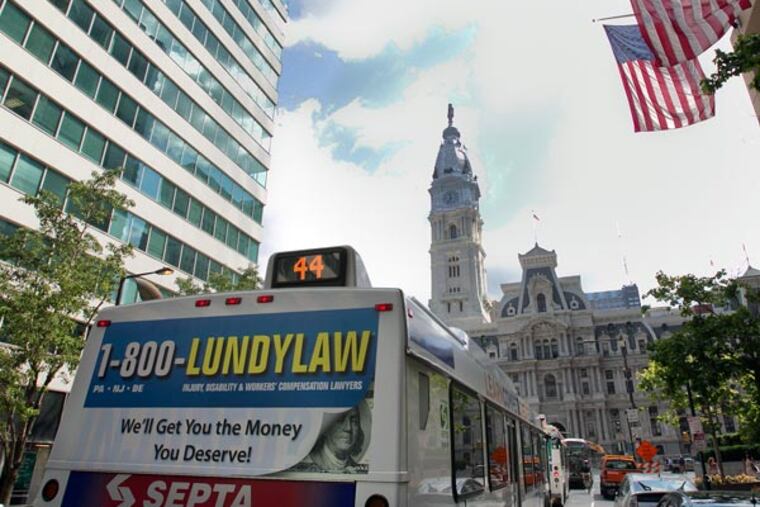Law firms clash over ads on SEPTA buses
Competition for clients in the rough-and-tumble world of personal-injury law in Philadelphia, intense even during the best of times, is getting sharper.

Competition for clients in the rough-and-tumble world of personal-injury law in Philadelphia, intense even during the best of times, is getting sharper.
And playing out on SEPTA buses near you.
Two of the city's better-known players in that space now are locked in a bitter antitrust battle. One firm is accusing the other of using underhanded and illegal tactics to lock up advertising on SEPTA buses, at the Wells Fargo Center, and on KYW radio, among other spots.
In a lawsuit filed in federal District Court in Philadelphia, Larry Pitt & Associates, itself a prodigious advertiser, accuses competitor Lundy Law of violating the Sherman Antitrust Act by illegally signing exclusive ad contracts. Pitt contends the contracts suppress potential revenue to SEPTA and deprive the public of information about legal services.
Larry Pitt says that he and other personal-injury lawyers had been advertising, or sought to advertise, on SEPTA buses but were told last year that Lundy had locked up advertising with exclusive contracts that barred ads on the outside of buses from other lawyers.
Nonsense, says Lundy, contending that Pitt and other personal-injury lawyers are free to advertise on the inside of buses, if they like.
Both firms, which focus on personal injury, Social Security disability, and workers' compensation claims, are little known outside of the Delaware Valley. But the financial stakes are significant enough that both parties have hired heavy legal guns to represent them.
Lundy is represented by Robert Heim, a top litigator at University City-based Dechert L.L.P., one of the nation's most prominent firms and consistently ranked near the top of national charts in terms of profitability.
Representing Pitt is Philadelphia lawyer Carl W. Hittinger, of DLA Piper, one of the largest law firms in the world.
The legal rhetoric has been heated.
"Defendant Lundy has engaged in a predatory campaign with others to eliminate competition from Pitt Law and other small personal-injury and Social Security disability and workers compensation law firms, and to harm Pitt Law as a direct competitor," the lawsuit said. "Defendant Lundy's predatory campaign has included the monopolization of advertising legal services . . . and has significantly impacted competition."
In one of his first acts as president, Teddy Roosevelt ordered his attorney general, Pennsylvanian Philander Knox, to block a nationwide railroad merger Roosevelt feared would concentrate control of rail traffic in the hands of a few well-heeled businessmen in New York and Chicago - at the expense of everyone else.
It was the first full-fledged attempt by the federal government to enforce the provisions of the Sherman Antitrust Act, the aim of which was to block formation of cartels and business practices that aimed at stifling competition.
Were he alive today, Roosevelt might find himself startled by this latest iteration of antitrust litigation playing out here.
Heim asserted there was no basis in antitrust law for the lawsuit because Pitt and other personal-injury lawyers can advertise elsewhere, including on the inside of the buses.
"I think this lawsuit is pretty far-fetched," Heim said. "These are two competing law firms and somehow there is some personal animus there, which shouldn't be, but it certainly isn't an antitrust case."
According to a document obtained by Pitt's legal team, Lundy Law paid $435,000 to advertise on SEPTA buses during 2012. Hittinger said that was almost 10 times the rate that Pitt paid during the time his firm advertised on the exterior of SEPTA buses.
The Pitt lawsuit also alleges that because Lundy's daughter, Sara, is an account executive at Titan Advertising Inc., which handles advertising sales for SEPTA, Lundy has an unfair advantage. Heim rejected that claim, noting that Lundy had similar arrangements with public transit agencies in Wilmington and Reading that deal with other advertising agencies.
"This is a serious lawsuit involving very important competitive issues between two competing law firms," Hittinger said. "The defendant in this case has acted in numerous ways that are both anti-competitive and unfair to its competitors and the lawsuit is addressing that conduct."
In his complaint, Pitt maintains the most effective outlet for personal-injury law firms is the exterior of a public bus. While billboards are stationary and viewed by the same people every day, advertising on public buses is akin to having a movable billboard. Controlling that advertising outlet can give a firm insurmountable advantages.
Pitt charges that since Lundy Law won exclusivity last year, Pitt's net income has dropped 15 percent.
SEPTA spokesman Fran Kelly said the transit agency does not contract directly with advertisers and that such transactions are handled exclusively by its advertising agency. Titan keeps a portion of the revenue generated by its ad sales, so the relationship is structured to maximize value for taxpayers and SEPTA riders, Kelly said.
Kelly said complaints by Pitt and other firms that they too would like to advertise on SEPTA buses should work to SEPTA's advantage.
"I am happy that there is this type of interest," he said. "I would expect that it could only drive the price up."